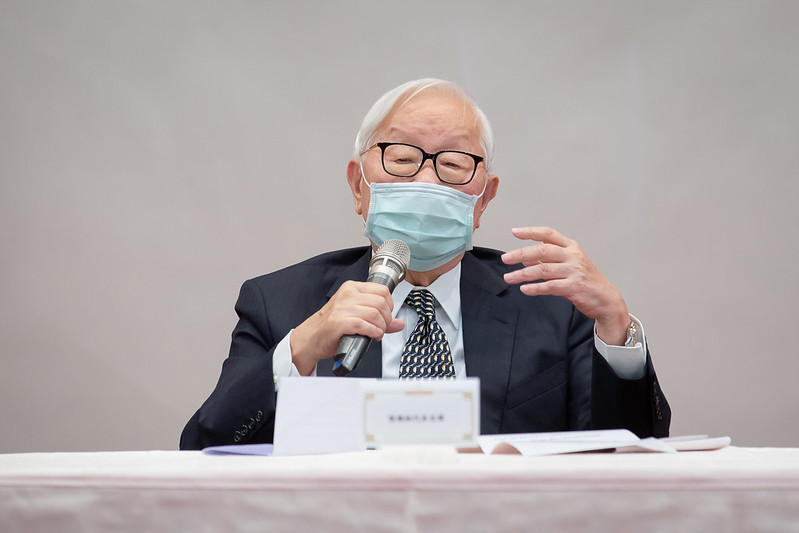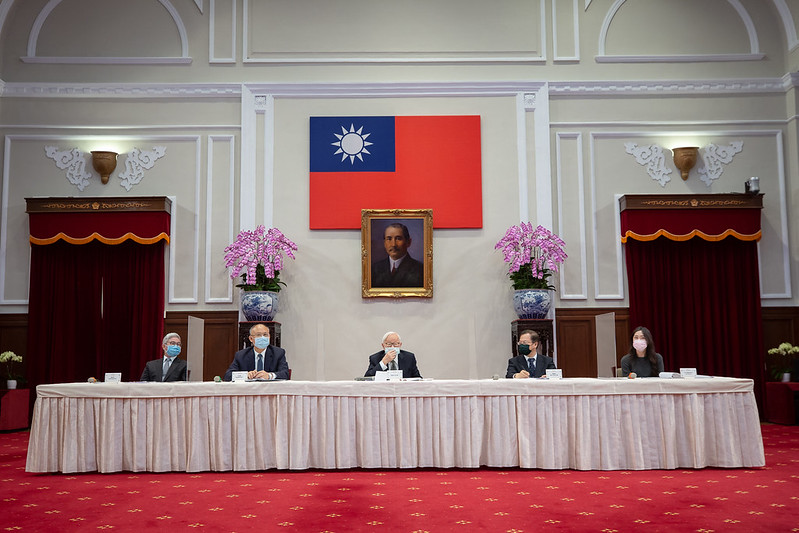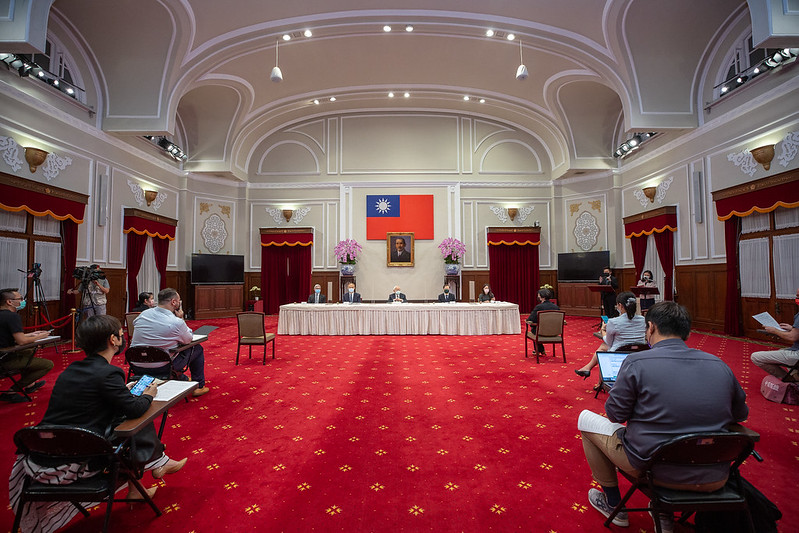News & activities
 News releases
News releases
On the evening of July 16, the Presidential Office held a press conference following the APEC Informal Leaders' Retreat. Accompanied by Minister without Portfolio John C. C. Deng (鄧振中), National Development Council (NDC) Minister Kung Ming-hsin (龔明鑫), National Security Council Deputy Secretary-General Hsu Szu-chien (徐斯儉), and Director-General Sharon S. N. Wu (吳尚年) of the Ministry of Foreign Affairs' Department of International Organizations as Senior Official for APEC, Leader's Representative Dr. Morris Chang (張忠謀) gave an overview of the meeting and answered questions from the media.
In his remarks at the press conference, Dr. Chang noted that this Informal Leaders' Retreat was convened by APEC host New Zealand in addition to the annual APEC Economic Leaders' Meeting, which will be held in November this year. The closed-door retreat lasted about two hours and 40 minutes, with enthusiastic participation from all the attendees. Following opening remarks from New Zealand Prime Minister Jacinda Ardern, International Monetary Fund Managing Director Kristalina Georgieva and WHO Health Emergencies Programme Executive Director Dr. Michael Ryan delivered speeches on the economic and public health implications of the COVID-19 pandemic, with both expressing optimism about global economic prospects and pandemic control efforts this year.
Leader's Representative Chang also shared the address he delivered at the APEC Informal Leaders' Retreat. The full text of the address follows:
This Informal Retreat has been called to discuss how Asia-Pacific can collaborate to move through the COVID-19 health crisis, and to accelerate the post-COVID economic recovery. Chinese Taipei will address these two topics specifically.
On COVID-19, Chinese Taipei has had an excellent record so far. With a population of 23 million, over the last year and a half, and in spite of a recent surge which has now abated, we have had a total of about 15,000 cases (0.07 percent of the population) and 763 deaths (3 out of 100,000).
We believe that our experience and know-how gained can help other APEC members. We have been, and continue to be willing, to help. We have donated masks and other medical supplies to other APEC members in the past and are ready and willing to share our anti-COVID-19 know-how with you.
At the same time, we need help. Our vaccination coverage at present is less than 20 percent. Although the US and Japan have been generous in donating vaccines to us, and our private institutions have succeeded in procuring 10 million doses, we still need more vaccines, and need them sooner. Most other APEC members need help as well. We must ask for help from the APEC members that possess and produce more vaccines than they themselves need.
On revitalizing the post-COVID economy, Chinese Taipei urges free trade among APEC members and in the world, after giving consideration to vital national security needs.
In the past seven decades, free trade has enabled vibrant growth in most APEC economies. Free trade is merely a way in which each APEC economy contributes its own competitive advantage, and every APEC member benefits.
Recently, however, we note with concern the tendency to want self-sufficiency or "onshoring" of semiconductor chips. We must point out that the past decades of free trade have greatly helped the advance of semiconductor technology. In turn, the ever-greater complexity of the technology has caused the supply chain to go "offshore."
It would be highly impractical to try to turn back the clock. If it is tried, cost will go up and technological advancement may slow. What may happen is that after hundreds of billions and many years have been spent, the result will still be a not-quite-self-sufficient and high-cost supply chain.
We do recognize national security concerns, and believe that for security applications, a self-sufficient supply chain within one's own borders is prudent. However, for the much larger civilian market, a supply chain substantially based on a free trade system is by far the best approach.
In summary, on COVID-19, Chinese Taipei can help, and is ready and willing to help with its know-how, but also needs more vaccines sooner, along with many other APEC members. On post-COVID economic revitalization, Chinese Taipei urges free trade, after giving consideration to vital national security concerns.
Dr. Chang then took questions from the media.
Asked if an initial consensus was formed or progress was made with vaccine-producing countries on the issue of balancing vaccine supply and demand, Dr. Chang stated that, of the 21 APEC members at the meeting, the United States, China, and Russia are producing vaccines, and they did not talk about the same things as the other 18 members. However, the attendees all expressed a desire for unity, said Dr. Chang, who added that everyone was very courteous.
Dr. Chang was also asked how the majority of attendees responded to his call for free trade in the post-COVID-19 economic recovery, given consideration of key national security needs, and if there were differing opinions on this matter. He was also asked how, with pressure from China described as perhaps the greatest challenge or obstacle to fair vaccine access, can we overcome this situation in a way that is acceptable to most leaders and can facilitate fair access to vaccines.
Dr. Chang responded by pointing out that he was the 18th of the 21 members to address the meeting, and the three members who spoke after him, including the United States, did not respond directly to his comments.
NDC Minister Kung also responded, saying that many APEC leaders did indeed mention issues of how to more fairly and quickly acquire more vaccines and how to control the pandemic through inoculation. Minister Kung said that several leaders at the meeting also mentioned that, after the pandemic, APEC must quickly restore and promote the trend toward free trade and its principles.
Dr. Chang was further asked if he was concerned that plans by Taiwan Semiconductor Manufacturing Company (TSMC) to set up a factory in the US, expand production in China, and consider a plant in Japan would lead to the "not-quite-self-sufficient and high-cost supply chain" which he said in the meeting would result from a growing desire for self-sufficiency in semiconductor chips.
Dr. Chang replied that there is no conflict between the approach of his TSMC colleagues and his own comments, and said that if no one expresses what should be done amid the current trend toward domestic semiconductor production, there may be serious consequences, both for us and for those countries who may spend billions and many years but still end up with a not-quite-self-sufficient supply chain as well as high capital and production costs. For these reasons, said Dr. Chang, the best way to resolve supply chain issues is through free trade.
Dr. Chang added that, while he understands each country has its own national security concerns, he feels that national security applications usually only affect a small number of supply chains, and that larger-scale private markets should remain free.











